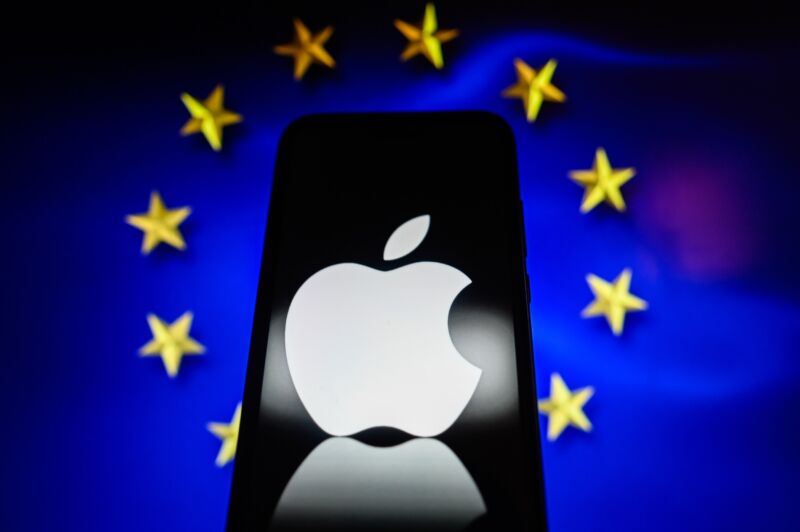
Getty Images | SOPA Images
Apple has suffered a significant defeat after the EU’s top court ruled that the iPhone maker must pay €13 billion in back taxes, overturning an earlier decision in the Big Tech group’s favor.
The ruling relates to a 2016 case when the EU’s competition chief Margrethe Vestager said that Ireland had given the company an illegal sweetheart deal, amounting to a tax rate of less than 1 percent.
The European Court of Justice said on Tuesday in its final ruling that it “confirms the European Commission’s 2016 decision: Ireland granted Apple unlawful aid which Ireland is required to recover.”
A lower court had in 2020 quashed the commission’s order and the ECJ’s decision to overturn that ruling was unexpectedly decisive.
Apple chief executive Tim Cook has previously dismissed the commission’s position as “total political crap.” On Tuesday the company said the EU was “trying to retroactively change the rules and ignore that, as required by international tax law, our income was already subject to taxes in the US.”
Reacting to the ECJ judgment, Vestager said: “It’s a win for the commission. It’s also a win for the level playing field of the internal market and for tax justice.”
The Irish finance ministry said it would consider the ruling but added: “The Irish position has always been that Ireland does not give preferential tax treatment to any companies or taxpayers.”
The case has been watched carefully across the bloc as a watershed moment over Big Tech’s tax affairs in Europe, with the EU’s efforts to probe the arrangements between companies and member states having previously suffered setbacks.
Last year, Amazon won a court battle over its tax arrangements in Luxembourg after the ECJ ruled that the commission could not force the large US e-retailer to pay €250 million in back taxes to Luxembourg. Brussels also lost a similar case over the Netherlands’ tax treatment of Starbucks but did not appeal against the ruling.
However, the ECJ on Tuesday affirmed the commission’s original finding that Apple’s tax structure in Ireland—which excluded the profits generated from the intellectual property licenses held by its international and European arms—amounted to state aid.
Apple subsequently ended its “Double Irish” structure, after Ireland closed the loophole in 2015. Meanwhile, a new global minimum tax rate that came into force this year across many countries applies a global minimum effective tax rate of 15 percent on corporate profits.
However, Dan Neidle, founder of the Tax Policy Associates think-tank, said the ECJ’s Apple decision would still have “significant implications” that will force member states and multinational companies to reconsider how profits are allocated between countries.
Neidle said: “It’s a massive victory for the commission – their strategy of using competition law and state aid to override domestic tax rules has succeeded. I and most observers thought it wouldn’t – we were wrong.”
Aidan Regan, associate professor of political economy at University College Dublin, said that in Ireland there would be a “public clamor” to use the cash to help resolve big challenges, especially a chronic housing crisis.
Ireland has been told to collect €13 billion from money placed in an escrow account for the past six years, as the parties awaited a ruling from the ECJ. The total in the account has fallen from the original €14.3 billion set aside in 2018, as the money was invested in eurozone government bonds, which have dropped in value.
Separately on Tuesday, Brussels won a landmark antitrust case against Google after the ECJ ruled that the search giant abused its market power by ranking its shopping services over rivals—granting itself an illegal and unfair advantage. The court upheld a €2.4 billion EU competition fine against Google in the case.
Google said: “We are disappointed with the decision of the court. This judgment relates to a very specific set of facts. We made changes back in 2017 to comply with the European Commission’s decision. Our approach has worked successfully for more than seven years, generating billions of clicks for more than 800 comparison shopping services.”
The pair of rulings represent victories for Vestager, the EU’s competition chief who is expected to depart the role this year. During her decade-long tenure, she has repeatedly taken on high-profile cases targeting the world’s biggest technology companies.
© 2024 The Financial Times Ltd. All rights reserved. Not to be redistributed, copied, or modified in any way.




















+ There are no comments
Add yours